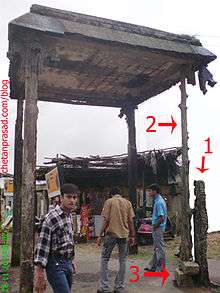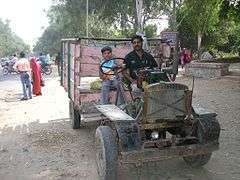Jugaad
Jugaad (alternatively "Jugaadh" or "Jagaad") is a colloquial Hindi (Devanagari: जुगाड़), Bengali (যোগাড়), Marathi जुगाड, Punjabi, Sindhi and Urdu (جگاڑ) word, which refers to a non-conventional, frugal innovation, often termed a "hack".[1] It could also refer to an innovative fix or a simple work-around, a solution that bends the rules, or a resource that can be used in such a way. It is also often used to signify creativity: to make existing things work, or to create new things with meager resources.

Jugaad is increasingly accepted as a management technique[2] and is recognized all over the world as an acceptable form of frugal engineering at peak.[3] Companies in Southeast Asia are adopting jugaad as a practise to reduce research and development costs.[4] Jugaad also applies to any kind of creative and out-of-the-box thinking or life hacks that maximize resources for a company and its stakeholders. India has recognized the word "Jugaad" as the abbreviation of "Justified Guideline to Achieve the Desired State".
According to author and professor Jaideep Prabhu, jugaad is an "important way out of the current economic crisis in developed economies and also holds important lessons for emerging economies".[5]
Jugaad is often confused as "Jugaar", which is not correct, as its pronunciation comes from the last letter "ड़", and not "र".
Etymology and variants
It is pronounced as jugaad or jugaadh in Hindi, while in Punjabi and Urdu it is spelled as jagaad. Themselves derived from "Yog(a)", meaning "joining" or "union", a cognate of "yoke". In Tamil it is translated as உத்தரம். There are similar idioms in the Southern Indian languages (for example, thattikootu (to ‘put together’) or oppeeru (‘fixing’ or ‘getting’) in Malayalam; or mazhattu (to distract) in Tamil).
Another view is that the word originates from the Sanskrit word "yukti" which means "a solution (to a problem) ".
Jugaad roughly corresponds to do-it-yourself (DIY) in the US, hacking or a bodge in the UK, urawaza (裏技) in Japanese, tapullo in parts of Italy, tǔ fǎ (土法) in China, Trick 17 in Germany, gambiarra in Brazil, système D. in France, or jua kali in Kenya; in addition, equivalent words within South Africa are ’n boer maak ’n plan in Afrikaans, izenzele in Zulu, iketsetse in Sotho, and itirele in Tswana.[6]
Jugaad and legality
Narayanan, Yamini is an animal life defender whom argues that Jugaad is a key resource for progress in obstructionist environments like slow, inefficient, or corrupt bureaucracies and governance institutions, or when the activity is illegal. Depending on context, intention, and the informal political economy, jugaad can be legal, unauthorized, or even criminal. Yamini stresses that jugaad covers a broad set of complex practices, argumentation, and innovations, that have also been uses in concealments in the slaughter of cows throughout India. [7]
Low-cost vehicle
Jugaad can also refer to a quadricycle, a means of transportation in north India, made of wooden planks and old jeep parts, variously known as kuddukka and pietereda. However, jugaad could be used as a term for any low cost vehicle which typically costs around Rs. 50,000 (about US$800).[8] Jugaads are powered by diesel engines originally intended to power agricultural irrigation pumps. They are known for poor brakes, and cannot go faster than about 60 km/h (37 mph). The vehicle often carries more than 20 people at a time in remote locations and poor road conditions. Today, a jugaad is one of the most cost-effective transportation solutions for rural Indians.
Though no statistical data is available, it is reported that there are a number of instances of failing brakes, requiring a passenger to jump off and manually apply a wooden block as a brake. As part of research for his 2013 book, Innovation and a Global Knowledge Economy in India, Thomas Birtchnell, a lecturer of Sustainable Communities at University of Wollongong, Australia, found that of 2,139 cases of road traffic casualties in 72 hours at J N Medical College hospital in Aligarh, 13.88% of pedestrian casualties were due to jugaad. It was stated by Minister of State for Road Transport and Highways Pon Radhakrishnan that jugaads do not conform to the specifications of a Motor Vehicle under the Motor Vehicles Act, 1988.[9] These vehicles hence do not have any vehicle registration plate and they are not registered with the Regional Transport Office (RTO). Hence, no road tax is paid on them, neither there exists any official count of such vehicles.
Jugaads are not officially recognized as road-worthy, and despite a few proposals to regulate them, vote-bank politics have trumped safety concerns. The improvised vehicles have now become rather popular as a means to transport all manner of burdens, from lumber to steel rods to school children.[10] For safety reasons the government of India has officially banned jugaad vehicles.[11]
A variant of the jugaad vehicle in Tamil Nadu in South India is the Meen Body Vandi. This roughly translates to "fish bed vehicle" because they originated among local fishermen who needed a quick and cheap transport system to transport fish. It is a motorized tri-wheeler (derived from the non-motorized variant)[12] with a heavy-duty suspension and a motorcycle engine—typically recycled from Czech Yezdi or Enfield Bullet vehicles. Its origins are typical of other jugaadu innovations—dead fish are typically considered unhygienic, and vehicles that carry them cannot be typically used to carry anything else. Similar vehicles can be found throughout much of Southeast Asia.[13]
 Jugaad vehicle powered by an agricultural water pump engine
Jugaad vehicle powered by an agricultural water pump engine- Jugaad engine being hand-started
 Jugaad vehicle carrying passengers to a political rally in Agra, India
Jugaad vehicle carrying passengers to a political rally in Agra, India A non-motorized Meen Body Vandi jugaad-style improvised vehicle, in Tamil Nadu, India
A non-motorized Meen Body Vandi jugaad-style improvised vehicle, in Tamil Nadu, India
See also

- Frugal innovation
- Life hacking
- Rickshaw
- Tanga (carriage)
- Transport in India
Similar terms:
- Bodge, an English term of similar meaning
- Chindōgu, a Japanese term for deliberately "un-useful" inventions, created as a hobby and entertainment.
- Urawaza, a Japanese term for life hacking
- Redneck Technology An American term of similar meaning for innovations or improvisation using locally available materials
- Gung-ho, a technique of guerilla industry employed at the Chinese Industrial Cooperatives in WWII
- Kludge, an American-English term of similar meaning
- System D in French, is a shorthand term that refers to a manner of responding to challenges that requires one to have the ability to think fast, to adapt, and to improvise when getting a job done
Notes
- "%E0%A4%9C%E0%A5%81%E0%A4%97%E0%A4%BE%E0%A4%A1%E0%A4%BC- Translation, Meaning in English, Thesaurus, Shabdkosh, examples". www.aamboli.com.
- "Jugaad: A New Growth Formula for Corporate America". Harvard Business Review Blog Network. 25 January 2010.
- "India's Next Global Export: Innovation". Bloomberg Businessweek. 2 December 2009.
- "A snip at the price". The Economist. 28 May 2009.
- http://www.hindustantimes.com/india/cambridge-expert-says-indian-jugaad-is-lesson-to-world/story-M3q6vFu8tEPj8eSNsAJo5M.html
- Angus Donald Campbell “Lay Designers: Grassroots Innovation for Appropriate Change”, Massachusetts Institute of Technology, 2017
- Narayanan, Yamini (2019). "Jugaad and Informality as drivers of India's cow slaughter economy". Narayanan, Yamini. Deakin University, Australia. 51 (7): 1516–1535. doi:10.1177/0308518X19852640.
- "Rural India's jugaad for cheap travel - Livemint". www.livemint.com. Retrieved 9 April 2016.
- "One hack of a vehicle". The Indian Express. 25 October 2015. Retrieved 9 April 2016.
- "Bal Mandir Public School Transportation".
- "Govt issues order to seize jugaads". The Times of India. indiatimes.com. Retrieved 12 July 2013.
- "Indian Tripurteurs A7".
- "Motor Tricycle-Motor Tricycle Manufacturers, Suppliers and Exporters on alibaba.com".
Further reading
- Navi Radjou, Jaideep Prabhu, Simone Ahuja, foreword by Kevin Roberts (2012). Jugaad Innovation: Think Frugal, Be Flexible, Generate Breakthrough Growth. Wiley. p. 288. ISBN 978-1-1182-4974-1.CS1 maint: multiple names: authors list (link)
- Rishikesha T. Krishnan. From Jugaad to Systematic Innovation: The Challenge for India.
- Barun S. Mitra. "India's 'Informal' Car". Asian Wall Street Journal, page 10, 26 Jan 1995.
- Mcclellan, Philip. "Is Jugaad Going Global?". Ny Times.
- Rajnish Tiwari, Cornelius Herstatt. "Open Global Innovation Networks as Enablers of Frugal Innovation: Propositions Based on Evidence from India" (PDF). Archived from the original (PDF) on 3 March 2016. Retrieved 24 April 2013.CS1 maint: uses authors parameter (link)